Reviews of "Rocketman," "Dark Phoenix" and "The Fall of the American Empire" are all in the latest Movies with Meaning post on the web site of The Good Media Network, available by clicking here.

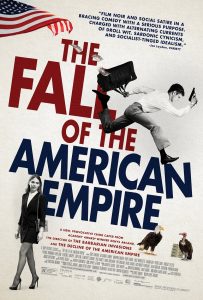

Monday, June 24, 2019
This Week in Movies with Meaning
Wednesday, June 19, 2019
‘Dark Phoenix’ probes the impact of underlying intents
“Dark Phoenix” (2019), Cast: James McAvoy, Michael Fassbender, Jennifer Lawrence, Nicholas Hoult, Sophie Turner, Jessica Chastain, Tye Sheridan, Alexandra Shipp, Evan Peters, Kodi Smit-McPhee, Scott Shepherd, Hannah Anderson, Summer Fontana, Ato Essandoh, Brian d’Arcy James. Director: Simon Kinberg. Screenplay: Simon Kinberg. Story: John Byrne, Chris Claremont and Dave Cockrum, “The Dark Phoenix Saga.” Comic Book Source: Stan Lee and Jack Kirby. Web site. Trailer.
When we converse with someone, we like to think we understand the meaning behind everything they’re saying. But are we truly grasping the beliefs, intents and motivations underlying their statements? And what about their actions and gestures – can we say the same about those, too? Sometimes we need to take a closer look to make sure that we’re correctly reading their intentions, a theme that runs through the latest installment in the X-Men franchise, “Dark Phoenix.”
In an alternate version of 1992, life for the mutant beings known as the X-Men is finally starting to improve after years of widespread public prejudice and skepticism, concerns raised during turbulent incidents depicted in the previous two films in the franchise, “X-Men: Apocalypse” (2016) and “X-Men: Days of Future Past” (2014). In fact, the group’s mentor and leader, Prof. Charles Xavier (James McAvoy), is about to be honored by the President (Brian d’Arcy James) for his efforts at helping the mutant students of his special school learn how to channel their powers and abilities into productive pursuits. That positive image is further reinforced when a contingent of X-Men saves the crew of a space shuttle from disaster, a triumphant accomplishment that earns them a hero’s welcome upon their return to Earth.
The figure chiefly responsible for the success of the space rescue is Phoenix (a.k.a. Jean Grey) (Sophie Turner), a mutant who is able to focus her psychic powers to work various kinds of miracles, such as establishing a protective energetic shield against opposing forces, something she did in helping to save the shuttle crew. It’s a skill she’s possessed since she was a child (Summer Fontana) but that she has often struggled to control. In fact, that lack of control contributed to the death of her parents (Hannah Anderson, Scott Shepherd) in a horrific car accident when Jean was eight years old. Despite the heartache of that tragedy, though, the incident brought her into contact with Prof. Xavier, who essentially raised the youngster and helped her learn how to put her talents to best use.
[caption id="attachment_10792" align="aligncenter" width="300"] Phoenix (a.k.a. Jean Grey) (Sophie Turner) struggles to manage her tremendous psychic powers in “Dark Phoenix,” the latest installment in the X-Men movie franchise. Photo courtesy © 2019 Marvel & Subs. and © 2019 Twentieth Century Fox Film Corporation.[/caption]
Phoenix (a.k.a. Jean Grey) (Sophie Turner) struggles to manage her tremendous psychic powers in “Dark Phoenix,” the latest installment in the X-Men movie franchise. Photo courtesy © 2019 Marvel & Subs. and © 2019 Twentieth Century Fox Film Corporation.[/caption]
In spite of Jean’s heroics, however, she’s not quite the same when she returns from her space adventure. She’s somewhat out of sorts, having apparently been exposed to some potent energetic source that has interfered with the functioning of her psychic powers. It’s a cause for concern for her peers, most notably her friends Raven (Jennifer Lawrence), Beast (Nicholas Hoult), Storm (Alexandra Shipp), Quicksilver (Evan Peters) and Nightcrawler (Kodi Smit-McPhee), as well as her romantic interest, Cyclops (Tye Sheridan). Somewhat surprisingly, Prof. Xavier doesn’t appear to be as concerned as the others believe he should be, but then he’s more preoccupied with getting ready to accept his accolades than worrying about someone who has a history of ups and downs that have always managed to work themselves out.
Matters get amped up, however, when Jean learns some disturbing news about her past. Given her presently unstable state of mind, those revelations set her off, leading to an unforeseen tragedy and the release of an onslaught of fury against her longtime mentor. These events upset relations among the X-Men and Prof. Xavier, since he’s being held responsible for everything that has now transpired. He contends that he believes he acted in Jean’s best interests, but, with havoc reigning among his kindreds, he’s become something of a pariah to those who have trusted him for so many years.
Meanwhile, Jean goes in search of an old colleague, Magneto (Michael Fassbender), an X-Man who has had a stormy on-again/off-again relationship with Prof. Xavier over the years. When she explains what’s happened, she enlists his support to get retribution. But, on her way to seeking vengeance, a further wrinkle develops that threatens to exacerbate an already-tense situation.
In a remote lakeside community, an alien craft makes a discreet landing. The ship’s occupants take over the bodies of local residents, their contingent led by a being known as Vuk (Jessica Chastain). She and her minions are on a mission to acquire something they desperately crave, a powerful force that they believe will make them invincible. And the source of that elusive enigmatic power is Jean.
With Vuk and company in pursuit of Jean, and with chaos erupting among the X-Men, the threat of havoc being unleashed looms large. The stakes are incalculably high as the community of mutants is on the verge of being torn apart. Meanwhile, all of the goodwill that has been built up between the X-Men and the public is in danger of coming undone, potentially plunging society back into rampant suspicion and mistrust. Given these circumstances, it will seemingly take a miracle to resolve matters. Should that happen, though, perhaps a new Phoenix will rise from the ashes, supplanting the Dark counterpart who’s threatening to let loose a reign of terror on the planet.
If someone were to ask, “Is fire good or bad?”, what would you say? Ultimately, it would depend on what it was to be used for. To provide heat or to cook food, fire would be seen as a valuable tool. But, if it were to be used in an act of arson, it would be seen as a weapon of destruction. In essence, the fire itself is neither intrinsically good nor bad; what matters is how it’s used, something that depends on the intents underlying its application.
That analogy is relevant in many contexts, including our beliefs, the driving force of the conscious creation process, the philosophy that maintains we draw upon the power of these resources in manifesting the reality we experience around us. The various elements that we create often have dual purposes, both positive and negative, their characterization dependent on the intended use behind them. A hammer, for example, can be beneficially used for hanging a picture or detrimentally employed for smashing a window. It all depends on the beliefs underlying its use.
[caption id="attachment_10794" align="aligncenter" width="300"] Raven (Jennifer Lawrence) worries about the well-being of an X-Men colleague in the new superhero adventure, “Dark Phoenix.” Photo by Doane Gregory, courtesy © 2019 Marvel & Subs. and © 2019 Twentieth Century Fox Film Corporation.[/caption]
Raven (Jennifer Lawrence) worries about the well-being of an X-Men colleague in the new superhero adventure, “Dark Phoenix.” Photo by Doane Gregory, courtesy © 2019 Marvel & Subs. and © 2019 Twentieth Century Fox Film Corporation.[/caption]
That’s an issue Jean has struggled with throughout her life. Learning how to manage her power has been an ongoing challenge; sometimes it’s used for good and at other times for questionable purposes, depending on how she believes it should be deployed. The principal question for her is knowing what to do when, especially when it comes to putting on the brakes.
Understanding this is important not only in our own manifestation efforts, but also in attempting to grasp the intentions of others. If we misinterpret the beliefs behind their creations, we may subsequently respond just as erroneously with reactions that are off the mark, potentially making matters far worse. It’s the metaphysical equivalent of pouring an accelerant on a raging bonfire. This is at the heart of the conflict that arises between Jean and Charles after the revelations about her past emerge; he believes he was working for her benefit, while she saw it differently. This misunderstanding thus leads to circumstances that threaten to get out of control, and, given Jean’s powers, they could potentially end up far more disastrous than imagined.
Is there a solution for this? That’s hard to say, but something that could help immensely is learning to cultivate a wider view of possibilities. If we take a narrow view of things, we may be able to envision only a limited range of options, most or all of which might not be in line with someone’s actual underlying beliefs and intents. However, if we make an effort to realize that conscious creation essentially makes anything possible, we may be able to broaden our horizons and ponder possibilities not previously considered, avoiding needless and potentially damaging misunderstandings.
[caption id="attachment_10795" align="aligncenter" width="300"] Phoenix (a.k.a. Jean Grey) (Sophie Turner, left) matches wits with an alien known as Vuk (Jessica Chastain, right) for control of an invincible power source in “Dark Phoenix.” Photo by Doane Gregory, courtesy © 2019 Marvel & Subs. and © 2019 Twentieth Century Fox Film Corporation.[/caption]
Phoenix (a.k.a. Jean Grey) (Sophie Turner, left) matches wits with an alien known as Vuk (Jessica Chastain, right) for control of an invincible power source in “Dark Phoenix.” Photo by Doane Gregory, courtesy © 2019 Marvel & Subs. and © 2019 Twentieth Century Fox Film Corporation.[/caption]
How do we do this? Before we react to something in a way that might result in unwanted difficulties, we should stop and ask ourselves, “Why did this happen?” That pause may be enough to keep us from recklessly flying off the handle, both emotionally and metaphysically, allowing us to consider whether our first impressions are on or off the mark. Upon further reflection, we may realize that there are intents at work that might not be as easy to spot, preventing us from jumping on seemingly “obvious explanations” that are, in fact, in error. That’s something Jean should keep in mind if she hopes to keep peace in her adoptive family.
“Dark Phoenix” may not be a great X-Men offering, but it’s certainly not as bad as what many critics and some fans have been saying. This character-driven superhero tale is somewhat overwritten when it comes to exploring (and frequently misinterpreting) motivations, incorporating contemporary social issue symbolism, and getting in touch with feelings, so much so that the story tends to drag in the first half. The opening also gives surprisingly short shrift to the action-adventure elements, a shortcoming that’s fortunately made up for at the back end. However, when it comes to the story’s philosophical and metaphysical themes, the picture is spot-on, providing thoughtful viewing yet again in an unlikely context. In all, this release may not match its predecessors, but it does share valuable insights worth considering, all wrapped up in a well-acted, beautifully photographed package.
The marketing materials for this film have suggested that this could be the end of the franchise. Given the longevity and success of this series, I personally doubt that. In all likelihood, it will go through a reboot or a retooling, but I’m sure it will be back in some way, shape or form. If I’m wrong, however, I must admit that it would be disappointing if this film marked the end of the franchise, given that it’s a somewhat lackluster offering compared to its predecessors. And, considering all the many fine hours of entertainment the X-Men have provided over the years, I certainly hope that’s not the case.
It’s easy to misread others if we’re not looking closely enough. And that’s unfortunate, because such a simple misunderstanding can have tremendous consequences, such as a lost friendship, a failed relationship or the end of an otherwise-productive collaboration. In light of that, then, it would be worth our time and effort to examine our beliefs and the motivations of others to determine what’s really going on. If we fail at this, we may lose something that we can never get back, and what a tragedy that would be.
Copyright © 2019, by Brent Marchant. All rights reserved.
Tuesday, June 18, 2019
‘American Empire’ takes a critical look at what has value
“The Fall of the American Empire” (“La chute de l’empire américain”) (2018 production, 2019 release). Cast: Alexandre Landry, Maripier Morin, Rémy Girard, Maxim Roy, Louis Morissette, Florence Longpré, Patrick Ėmmanuel Abellard, Pierre Curzi, Vincent Leclerc, Eddy King, Anoulith Sintharaphone, Ayana O’Shun, Kémy St-Ėloy. Director: Denys Arcand. Screenplay: Denys Arcand. Web site. Trailer.
We all have our priorities when it comes to determining what we believe has value. But what exactly are those determinations based on? Do they arise from rigorously scrutinized considerations, or do they stem from arbitrary, capricious, cursory examinations? Are they decided upon by consensus, or do they vary from one individual to another? And are they fixed or flexible, changeable as needs arise or forever rigid? Those are among the questions examined in the quirky and thought-provoking new comedy-drama, “The Fall of the American Empire” (“La chute de l’empire américain”).
Pierre-Paul Daoust (Alexandre Landry) struggles to figure out what to do with his life. The soft-spoken, compassionate, thoughtful thirtysomething possesses a Ph.D in philosophy yet is reconciled to working as a delivery man for a Montreal courier company. As much as he values his education and intelligence, he also sees it as a curse. Knowledge, he has concluded, has become an underappreciated commodity, one that few people and organizations value. He laments that it can’t be put to a more useful and meaningful purpose. He thus anguishes endlessly about his underutilized abilities, stuck in a job in which he’s painfully underemployed and woefully underpaid.
What’s worse, though, is that Pierre-Paul’s ennui has begun to spill over into other areas of his life. His girlfriend, Linda (Florence Longpré), a single mother who works as a bank teller, has grown tired of his insipid, pathetic, rhetorical hand-wringing. And, after a year-and-a-half of dating with apparently little romance and no clear sense of direction for a potential future together, she has come to see him as a lost, pitiable soul, someone on whom she wants to waste no more time.
When Linda walks out on Pierre-Paul, he now has even less going for him in his life. He gets some personal satisfaction working at a soup kitchen for the homeless, especially when he’s able to help out his friend Jean-Claude (Vincent Leclerc), one of the charity’s regulars. But is this enough to fill the painfully obvious void that’s consuming this increasingly lost soul? After all, the only things he has to go back to after his volunteer pursuits are a small apartment and a job he abhors. He truly longs for a life-changing opportunity that will enable him to put his intellect, talents, outlook and idealism to use for fulfilling a greater and more benevolent purpose. Little does he know, however, that such an opportunity is about to come his way.
While making his delivery rounds, he arrives at one of his stops just as a robbery is taking place. Two thugs, Jacmel (Patrick Ėmmanuel Abellard) and Chenier (Kémy St-Ėloy), are caught up in a gun fight outside the business as Pierre-Paul seeks cover out of harm’s way. Hiding amidst a flurry of bullets flying around him, he witnesses both crooks get shot. Chenier is killed while Jacmel is injured and runs away. But, as this incident goes south, something unexpected happens with the potential to change the unwitting onlooker’s life: Both criminals drop the huge duffel bags they’re carrying, each stuffed with enormous stacks of cash grabbed during the robbery. When Pierre-Paul sees the loot staring back at him, he’s faced with a big decision: Does he turn it over to the authorities who are racing toward the crime scene, or does he grab the money for himself? With approaching sirens blaring, he must act fast: Will he listen to his conscience and choose the moral path, or will he nab this unforeseen bounty for himself?
With nary a moment’s hesitation, Pierre-Paul snatches the oversized sports bags and stuffs them inside his delivery van, hastily hiding them behind packages yet to be delivered. It would seem the discontented intellectual’s moment has at last come. But now what?
Within moments, police arrive, and the investigation begins, led by Detectives Carla McDuff (Maxim Roy) and Pete La Bauve (Louis Morisette). They suspect Pierre-Paul knows more than he’s saying, but they can’t prove anything. Meanwhile, as the authorities interrogate the courier, an unexpected visitor arrives on the scene, mobster Vladimir François (Eddy King). It seems the money stolen from the business belonged to him, stored there for safekeeping since he believed it to be an innocuous location that no one would suspect. Word of this soon makes its way to Pierre-Paul, which prompts him to wonder what to do with the cash – and whether he’s suddenly wanted by both the cops and the mob.
After the detectives allow Pierre-Paul to leave the crime scene, he stops at home to drop off the cash, but he’s now faced with two questions: (1) How is he going to store the money? (After all, given the size of the stash, there isn’t a mattress large enough to hide it all); and (2) What is he now going to do with his newfound fortune? (Having never had so much wealth before, he hasn’t taken the time to consider what to do with it). For the time being, he decides to rent a storage locker and stash most of the money there, leaving only a fraction of the cash on hand while he decides what to do.
In the wake of all this excitement, Pierre-Paul realizes he needs to relax and blow off some steam. He decides to treat himself to a little fun. With Linda out of his life, he hires an escort. But the woman he contacts is no ordinary streetwalker; given his intellectual sensibilities, he meets up with a seemingly erudite call girl, Aspasie (Maripier Morin) – allegedly the most expensive in Montreal – whom he finds online. Like most naïve first-time johns, and considering his particular needs for stimulation of a nature other than just physical, he’s instantly smitten with his sophisticated new acquaintance, becoming the latest victim of an ensnaring “romantic” cliché almost as old as his companion’s profession. But, somewhat unexpectedly, Aspasie (whose real name is Camille Lafontaine) takes a genuine liking to her young client, one that seems to be based on more than a business transaction.
[caption id="attachment_10783" align="aligncenter" width="300"] Underemployed philosophy Ph.D Pierre-Paul Daoust (Alexandre Landry, left) and his newfound “companion,” Aspasie (Maripier Morin, right), seek to make the most of an unexpected financial windfall while being pursued by both the mob and police in director Denys Arcand’s latest comedy-drama, “The Fall of the American Empire” (“La chute de l’empire américain”). Photo by Van Royko, courtesy of Sony Pictures Classics.[/caption]
Underemployed philosophy Ph.D Pierre-Paul Daoust (Alexandre Landry, left) and his newfound “companion,” Aspasie (Maripier Morin, right), seek to make the most of an unexpected financial windfall while being pursued by both the mob and police in director Denys Arcand’s latest comedy-drama, “The Fall of the American Empire” (“La chute de l’empire américain”). Photo by Van Royko, courtesy of Sony Pictures Classics.[/caption]
Despite this diversion, however, Pierre-Paul is still left with the question of what to do with his money. But a solution comes from seemingly out of the blue while watching TV. He learns that former high-profile mobster Sylvain “the Brain” Bigras (Rémy Girard) is about to be released from prison, ready to fulfill his intention of going straight by becoming a professional financial planner, a profession he trained for while taking classes during his incarceration. Given his unique skills, Pierre-Paul believes the Brain has just the qualifications he needs to help him out.
Pierre-Paul arranges to meet the newly released ex-con, but he’s initially uninterested in sharing his expertise with someone who appears to be involved in something way over his head. However, with a little convincing, Bigras relents and agrees to help the witless neophyte. That happens when the Brain realizes he can pool his own long-hidden funds with those of his new client to create a sheltered financial structure that no one can touch (or even trace), one put together with his newly acquired knowledge of the mechanics of international funds transfers. The unlikely duo soon joins forces with Aspasie and one of her former clients, Wilbrod Taschereau (Pierre Curzi), an allegedly respected but oily financial front man, to develop the scheme further. But, with McDuff, La Bauve and François all on their tail, they must act fast to stay ahead of them. And, when others become involved in the fray, like Pierre-Paul’s ex-girlfriend and the surviving thief who originally stole the money, the scenario threatens to spin out of control.
How everything plays out will keep everyone guessing right up to the end, especially when it’s revealed how the stash actually ends up being put to use. Money can indeed be employed for truly creative purposes, especially when the right intents are behind them. But just getting to that point may be the biggest challenge of all.
Like many of his other films, French-Canadian director Denys Arcand’s latest offering presents a richly layered tale, one in which there’s much more going on than meets the eye. On the surface, the picture tells the story of a crime caper peppered with colorful characters in unusual circumstances. However, upon closer inspection, this offering is loaded with social and philosophical themes, ideas whose relevance in contemporary society couldn’t be more pertinent.
[caption id="attachment_10785" align="aligncenter" width="300"] Former mobster-turned-financial planner Sylvain “the Brain” Bigras (Rémy Girard) reluctantly agrees to help a witless client hide a huge stash of illegally acquired cash in the insightful new French-Canadian comedy-drama, “The Fall of the American Empire” (“La chute de l’empire américain”). Photo by Van Royko, courtesy of Sony Pictures Classics.[/caption]
Former mobster-turned-financial planner Sylvain “the Brain” Bigras (Rémy Girard) reluctantly agrees to help a witless client hide a huge stash of illegally acquired cash in the insightful new French-Canadian comedy-drama, “The Fall of the American Empire” (“La chute de l’empire américain”). Photo by Van Royko, courtesy of Sony Pictures Classics.[/caption]
In examining the questions Arcand poses, one can’t help but ask how we’ve ended up in the situation in which we currently find ourselves. But, no matter how we slice it, we’ve arrived where we are as a result of the collective beliefs we hold. Realizing this is important, too, for these intangible tools provide us with the building blocks for engaging in the conscious creation process, the philosophy that maintains we draw upon their power in manifesting the reality we experience around us. And, in this film, the director examines how we use our beliefs to determine which commodities have value – and which ones don’t – an exercise aimed at getting us to take a good hard look at what we believe to be most important and, regrettably, what’s easily disposable.
At the heart of this story is something on which nearly all of us place considerable value – money. But what is money really? In purely practical terms, it’s just paper, yet, for whatever reason, we imbue it with incredible power that makes it supremely important. So what’s the real source of the power here – the material on which the currency is printed or the belief we put behind what that paper represents? It’s almost unthinkable that it would be the paper; after all, the cost of the raw material that goes into creating it is minimal. Moreover, the cost of printing a $5 bill is virtually identical to that of printing a $100 bill, so what really accounts for such a wide discrepancy in their value? From this, it would thus seem that the money’s perceived value comes from the beliefs we hold about it, particularly when it comes to what we believe it can help make possible.
When Pierre-Paul acquires his newfound stash of cash, the previously disempowered courier suddenly finds himself in possession of a physical commodity that symbolically represents the notion of power and value. The paper itself isn’t worth much, but what it can enable, thanks to the belief power we’ve put behind it, can be used for truly transformative purposes.
But what purposes should we use such a resource for? Well, that depends further on the manifesting beliefs we put behind the money. Should we use it for self-serving purposes, such as lining our own pockets? Or would it better utilized by funneling it into altruistic pursuits, such as helping the downtrodden? Either set of beliefs can be called upon, as each is equally valid. But, when we see what we can achieve with each option, the differing impact of those beliefs becomes abundantly clear. And, considering the outcomes that self-serving pursuits have yielded for our society, it’s apparent that money can indeed be more effectively spent on creating a better world for everyone and not just a privileged few. Director Arcand pulls no punches in making this point abundantly clear.
[caption id="attachment_10786" align="aligncenter" width="300"] Montreal police detectives Carla McDuff (Maxim Roy, left) and Pete La Bauve (Louis Morissette, right) doggedly track down a huge stash of cash lost in a high-profile robbery in “The Fall of the American Empire” (“La chute de l’empire américain”). Photo by Van Royko, courtesy of Sony Pictures Classics.[/caption]
Montreal police detectives Carla McDuff (Maxim Roy, left) and Pete La Bauve (Louis Morissette, right) doggedly track down a huge stash of cash lost in a high-profile robbery in “The Fall of the American Empire” (“La chute de l’empire américain”). Photo by Van Royko, courtesy of Sony Pictures Classics.[/caption]
So, if a more equitable distribution of wealth would benefit society as a whole, why aren’t we doing it? That’s a tricky question, but it again comes back to beliefs. For instance, many of us may want to see this result but don’t know how to accomplish it. We may have given away our power to a limited few who have taken advantage of us and prevented us from reaching this goal. Or we may not have thought creatively enough in coming up with solutions that make the distribution possible. But, as in all things, our beliefs are the solution.
To come up with beliefs aimed at devising workable solutions, we need to start by formulating those that are driven by workable intents. We essentially need to find the means to match the message, something that calls upon us to fuse practicality with idealism. One way to accomplish this is by combining the input we receive from our intellect and intuition, as each of them factor into arriving at the beliefs we need to reach our goals. Pierre-Paul, for example, is looking for an opportunity to put his abilities to use, one that reflects his intellect, his compassion and his desire to see a better world. As an underpaid, underemployed courier, though, there’s little he can do. He needs to manifest the means to better situate himself to fulfill his objectives, and, to do that, he needs to implement the kinds of beliefs that can make that happen.
This is something that suddenly becomes entirely possible when an unexpected windfall drops in Pierre-Paul’s lap. When he is confronted by this stash of cash, he has a choice to make – one that would be “ethical” but would return the money to a corrupt system or one that could be channeled into worthwhile pursuits, including those that have the potential to benefit those who have been cut out of society’s blessings. He may not be fully aware of the implications at the time he makes his choice, but, when he instinctively grabs the loot, almost without thinking, something in his intuition must have been telling him that this godsend will eventually allow him to achieve his goals – even if it would seem to violate the morals and ethics he’s been led to believe must be unquestioningly supported, no matter how corrupt the system is that espouses such notions.
By following up this action with the connections he forges with the Brain, Aspasie and Wilbrod, Pierre-Paul thus gives himself the practical means for pursuing what he’d like to do. This is his intellect at work, driving the creation of beliefs that help to manifest the materials for fleshing out his intuitionally inspired aspirations. He thus fuses the elements needed to come up with the beliefs needed to get his conscious creation skills firing on all cylinders.
[caption id="attachment_10787" align="aligncenter" width="300"]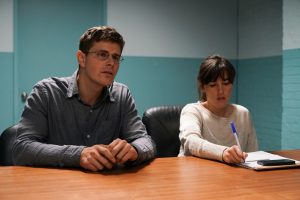 Underemployed philosophy Ph.D Pierre-Paul Daoust (Alexandre Landry, left) and his former girlfriend, Linda (Florence Longpré, right), reach an uneasy truce to work together while setting up a secure, untraceable overseas financial structure in director Denys Arcand’s latest release, “The Fall of the American Empire” (“La chute de l’empire américain”). Photo by Van Royko, courtesy of Sony Pictures Classics.[/caption]
Underemployed philosophy Ph.D Pierre-Paul Daoust (Alexandre Landry, left) and his former girlfriend, Linda (Florence Longpré, right), reach an uneasy truce to work together while setting up a secure, untraceable overseas financial structure in director Denys Arcand’s latest release, “The Fall of the American Empire” (“La chute de l’empire américain”). Photo by Van Royko, courtesy of Sony Pictures Classics.[/caption]
In living out our ultimate destiny, we get to see how the many diverse elements that have gone into the creation of our lives can come together to achieve what we were truly meant to do. This coalescence is a magical amalgamation of skills, ideas and other elements that draws upon everything we’ve previously done or achieved to fulfill our reason for being. No matter how disparate or unrelated these influences may seem individually, they may nevertheless combine collectively to accomplish our eventual objective. And it all happens thanks to the diverse array of beliefs that created the various individual pieces that comprise the overall picture of the finished puzzle. For his part, Pierre-Paul may not see this as his life unfolds, but, as things fall into place, he witnesses the materialization of truly astonishing results.
Of course, we might not always get things right on our first attempts. Indeed, we may make some serious – even potentially criminal – missteps along the way. But, as conscious creators well know, we always have an opportunity to redeem ourselves, to make amends for our past mistakes. Such do-overs allow us to begin anew, and so it is with many of the characters in this film, such as the Brain, Aspasie and even Pierre-Paul. They get a chance to renew themselves and embark on lives in new and improved realities.
At the same time, those who have wronged others – in this case those who are members of a greedy establishment – run the risk of seeing the consequences of their actions coming back to haunt them in big ways, often snared by their own means and methods. Some might call this karma or poetic justice, but, in conscious creation terms, this is the impact of responsibility coming home to roost. This is often driven by the impact of un-conscious creation or creation by default, wherein we seek to achieve our objectives at any cost, with no regard for the fallout that may accompany their efforts. This can be a painful lesson to experience, but, as noted above, the possibility of redemption always looms, too, making this yet another of the destinations we visit while on our journeys of personal discovery.
True to his signature style, Arcand’s latest offers his incisive insights into the human condition in much the same way as in his previous efforts. While the film is a bit talky at times and likely tells you more than you ever wanted to know about international monetary transfers, the picture has a heart and serves up more than a few pointed observations about ethics, greed and society’s recognition (or lack thereof) of what really has value. This beautifully filmed offering shows off Montreal in its best light while delivering a colorful tale of personal evolution, particularly when it comes to enlightening us on how to avail ourselves of opportunities when they come along. Although not for everyone, this fun, witty and observant release is a pleasant way to spend a few enjoyable hours at the show.
It’s been said that “Money is the root of all evil.” But is that true? What about those instances where it’s directed toward doing good in the world? Is that wrong? I’m sure the beneficiaries of such courtesy, consideration and kindness wouldn’t think so. In the end, money, like our beliefs, is a tool, one that can be put to either beneficial or destructive uses, depending on the intents underlying its application. Let’s hope we choose wisely.
Copyright © 2019, by Brent Marchant. All rights reserved.
Thursday, June 13, 2019
‘Rocketman’ celebrates creativity unleashed
“Rocketman” (2019). Cast: Taron Egerton, Jamie Bell, Richard Madden, Bryce Dallas Howard, Gemma Jones, Steven Mackintosh, Stephen Graham, Charlie Rowe, Tate Donovan, Matthew Illesley, Kit Connor, Tom Bennett, Sharmira Harrower, Ophelia Lovibond, Celinde Schoenmaker, Rachel Muldoon. Director: Dexter Fletcher. Screenplay: Lee Hall. Web site. Trailer.
The creative spark within each of us longs to be released. But that typically doesn’t happen until we give it the catalyst it needs to free itself, something we generally don’t supply until we recognize exactly what’s required for that to happen. Sometimes it even calls for elements and influences that we might ordinarily think would be highly unlikely for achieving success. Nevertheless, when these components come together, they can truly work magnificent wonders, a synthesis depicted in the entertaining and inspiring new musical biopic, “Rocketman.”
Young Reginald Dwight (Matthew Illesley) led a quietly challenging life while growing up in London’s Pinner neighborhood in the 1950s. As the often-ignored, often-criticized only child of a frequently absent military father, Stanley (Steven Mackintosh), and a self-absorbed mother, Sheila (Bryce Dallas Howard), Reggie struggled for any attention and affection he could muster, most of which came from his doting, live-in grandmother, Ivy (Gemma Jones). Unlike Reggie’s parents, Ivy could see that her grandson was gifted, even if a bit shy and withdrawn. That became apparent when the young lad showed a natural aptitude for music, most notably playing the piano and being able to compose beautiful melodies virtually spontaneously. His skills were so adept, in fact, that he soon earned a scholarship to the Royal Academy of Music.
Given the development of his talent, Reggie hoped that it would earn him the recognition from his father that he so craved, especially since Stanley was an avid music lover. Unfortunately, Dad continued to ignore and criticize his son as he always had, maintaining the distance that had long existed between them. What’s more, when Stanley learned that Sheila was having an affair with another man (Tom Bennett), he left for good. Fortunately, though, Reggie’s abilities continued to develop in his father’s absence. And, as the reserved tunesmith became a teenager (Kit Connor), he began taking an interest in a style of music that would change his life – rock ʼn roll.
As a young adult (Taron Egerton), Reg and a group of friends formed a band called Bluesology, successfully landing a series of gigs playing backup for American artists like the Isley Brothers and Patti LaBelle and the Bluebelles on tours of the U.K. But, despite the steady work, he grew restless, wanting to break out on his own, something he was at last able to do in 1967, when Ray Williams (Charlie Rowe) of Liberty Records introduced Reg to an aspiring lyricist, Bernie Taupin (Jamie Bell). And, in a move aimed at boosting his charisma, the pianist decided to change his name to something more captivating. Reggie Dwight thus became Elton John, a name that would soon become synonymous with pop music.
Elton and Bernie had a great chemistry from the outset. The songwriting duo joined forces with Dick James (Stephen Graham) of DJM Records, a curmudgeonly music industry pro who expected much but knew that pushing his new talent would pay dividends, as it did with the release of the singles “Border Song” and “Your Song” in 1970. James also helped arrange a live concert at the legendary Troubadour nightclub in West Hollywood, a performance that set the audience – and Elton’s career – on fire.
The young rocker was an instant success, but not just on the stage. Elton soon met John Reid (Richard Madden), an up-and-coming music manager/promoter who would revolutionize his new client’s career. With a string of hits like “Rocketman,” “Crocodile Rock” and “Daniel” and successful concert dates featuring fabulously flamboyant costumes and outrageous stage antics, Elton’s popularity grew by leaps and bounds. More than that, though, as Elton’s love interest, Reid helped the pop star become comfortable with his sexuality, something that he struggled with for years. Even though Elton was not yet ready to come out as a gay man, he was at least finding satisfaction in ways that had always seemed to elude him.
[caption id="attachment_10772" align="aligncenter" width="300"] Taron Egerton gives a signature performance as music icon Elton John in the superb new biopic, “Rocketman.” Photo courtesy of Paramount Pictures.[/caption]
Taron Egerton gives a signature performance as music icon Elton John in the superb new biopic, “Rocketman.” Photo courtesy of Paramount Pictures.[/caption]
With Reid’s assistance, Elton became a musical phenomenon, soaring to super-stardom in the ʼ70s. However, the pressure of success gradually took a toll. Elton soon became hooked on alcohol and a variety of other recreational substances, most notably cocaine. He also became an out-of-control shopaholic, spending lavishly at every turn. And, if that weren’t enough, he began to see that he was partnered to a philanderer who showed little genuine interest in him, using Elton as little more than a meal ticket.
Elton’s life began to spiral downward as he descended into a life of addiction and sexual compulsion. He desperately tried to drown his disappointment over the breakdown of his relationship, as well as bury a variety of unresolved issues from his upbringing, many of which spurred problems with anger management and eventually led to a suicide attempt. He also struggled with trying to stay in the closet, attempting to cover himself by pursuing a short-lived unsuccessful marriage to his friend Renate Blauel (Celinde Schoenmaker). And, as he descended into this deepening personal nightmare, his circumstances began to negatively impact the relationships that mattered most to him, such as his friendship and collaboration with Bernie.
With so much at stake, Elton realized he had to get clean, to vanquish his personal demons, which included all of the foregoing, as well as a bout with bulimia. But was it too late? Could he overcome the issues that had taken him so far down – and so far away from his true self? That’s what the rocketman had to find out for himself.
[caption id="attachment_10773" align="aligncenter" width="300"] Long-time collaborators Elton John (Taron Egerton, right) and Bernie Taupin (Jamie Bell, left) launch a storied career in director Dexter Fletcher’s latest release, “Rocketman.” Photo courtesy of Paramount Pictures.[/caption]
Long-time collaborators Elton John (Taron Egerton, right) and Bernie Taupin (Jamie Bell, left) launch a storied career in director Dexter Fletcher’s latest release, “Rocketman.” Photo courtesy of Paramount Pictures.[/caption]
At the time Elton bottomed out, his life was a mess, and, ironically, that’s where the film actually starts out, telling his story through a series of flashbacks intercut with scenes from group therapy sessions in which he bares his soul. It was a painful process for someone who seemingly had it all. But, if he was going to get clean, he had to discover how he got that way in the first place, an unraveling process that required him to get in touch with his deepest and innermost feelings.
This is a process not unlike what’s involved in becoming proficient with the practice of conscious creation, the philosophy that maintains we manifest the reality we experience through the power of our thoughts, beliefs and intents. Since these intangible building blocks are powerful tools for constructing the existence around us, we need to be aware of what they are and how we employ them, for they’re capable of bringing us tremendous success or horrendous heartache. As Elton found out, they truly can do both.
From an onlooker’s viewpoint, most of us would probably say that the fame and fortune he attained is enviable. Who wouldn’t want a life like that? At the same time, though, many of us would also likely wonder why he drew the profound heartache into his life that nearly cost him everything. Why would anyone want to experience such nightmares?
[caption id="attachment_10774" align="aligncenter" width="300"] Supportive grandmother Ivy (Gemma Jones, right) and self-absorbed mother Sheila (Bryce Dallas Howard, left) witness the rise of their future rock star son, Elton John, in “Rocketman.” Photo courtesy of Paramount Pictures.[/caption]
Supportive grandmother Ivy (Gemma Jones, right) and self-absorbed mother Sheila (Bryce Dallas Howard, left) witness the rise of their future rock star son, Elton John, in “Rocketman.” Photo courtesy of Paramount Pictures.[/caption]
[caption id="attachment_10775" align="aligncenter" width="300"]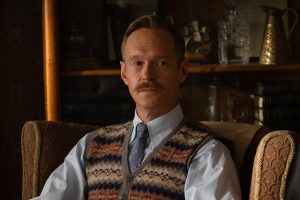 Frequently absent father Stanley Dwight (Steven Mackintosh) missed out on much of his superstar son’s upbringing as depicted in the musical new biopic, “Rocketman.” Photo courtesy of Paramount Pictures.[/caption]
Frequently absent father Stanley Dwight (Steven Mackintosh) missed out on much of his superstar son’s upbringing as depicted in the musical new biopic, “Rocketman.” Photo courtesy of Paramount Pictures.[/caption]
However, as is the case with anyone who practices conscious creation, our reasons are our own, and, frankly, they’re no one else’s business. Many of us may even engage in this process without being aware of doing so, as could well be the case here. Nevertheless, given that this discipline makes any potential outcome possible, we can use it for materializing wide-ranging results, including everything from exultant joy to the pit of despair. And, based on what happened in Elton’s life, he would appear to have experienced both ends of the spectrum.
One might ask, “What would be the value in engaging in such extremes?” Again, the reasons are each our own, but, in many cases, they have to do with learning particular life lessons that aid in our overall personal growth and development. For instance, in becoming accomplished as a composer of music that reflects many different moods, perhaps Elton needed to experience them all firsthand in order to identify with them, to provide himself with the emotional inspiration needed for translating these feelings into finished melodies. Indeed, would he have been able to write the music for such melancholic pieces as “Sorry Seems to Be the Hardest Word” or “Candle in the Wind” had he not felt the sadness associated with the emotions behind these works? Likewise, could he have composed an uplifting, toe-tapping hit like “I’m Still Standing” had he not gone through personal travails and managed to triumphantly survive them?
This notion is important not only for examining his body of work, but it’s also a crucial narrative device employed to carry the story in the film. In many ways, “Rocketman” is actually a movie musical that tells Elton’s life story through his many diverse compositions, the pieces strategically interspersed to mirror the events and moods he experienced over time. In that regard, this truly is an example of art imitating life, in large part because that life arises from the metaphysical artist within us, the portion of our being that creates with the brush strokes of our beliefs onto the rich and colorful canvas of existence.
[caption id="attachment_10776" align="aligncenter" width="300"]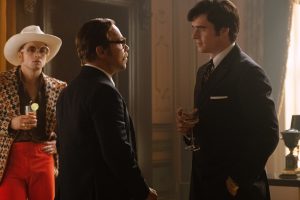 Self-serving manager/promoter John Reid (Richard Madden, right) frequently ran afoul of music industry professionals like Dick James (Stephen Graham, center) and even his own client and life partner, Elton John (Taron Egerton, left), as seen in “Rocketman.” Photo courtesy of Paramount Pictures.[/caption]
Self-serving manager/promoter John Reid (Richard Madden, right) frequently ran afoul of music industry professionals like Dick James (Stephen Graham, center) and even his own client and life partner, Elton John (Taron Egerton, left), as seen in “Rocketman.” Photo courtesy of Paramount Pictures.[/caption]
Elton’s story also inspires us by showing how we can use our personal creative power to break through the perceived limitations that hold us back from living our destiny. The controlling nature of Elton’s parents, for example, no doubt helps to explain his reserved nature while growing up. Out of fear of ridicule, he consequently retreated within himself, bottling up his considerable talent for years. Those abilities remained dormant, just waiting for the right moment to be liberated. And, when he finally gave himself permission – thanks to Ivy’s encouragement and the impetus of his own beliefs – to let those talents out, they came rushing forth in a torrent of creativity and flamboyancy. With his vision thus unleashed, he was free to let it take him places that he may have once thought unimaginable – and to bring him success beyond his wildest dreams.
That creative liberation spilled over into areas of his life other than his music. It made its presence felt in his personal life, particularly in the area of his sexuality. Even though he struggled for years to publicly acknowledge his true orientation – something that many gay men and women of the time wrestled with – he nonetheless allowed himself to act on his feelings and explore what they could offer him. This was not an easy feat in light of the constant chiding he experienced about the prospect, even into young adulthood, including by those who supposedly loved and cared about him. (His mother, for example, claimed she knew he was gay from the time he was a child but never encouraged him to act on it for fear that he would end up leading a lonely life and never be loved “properly.”) And, despite Elton’s admission during his therapy sessions to being a sexual compulsive, he still overcame the fear-based belief limitations that had held him back from being himself and subsequently finding true love (something, by the way, that came his way after getting clean, Sheila’s caustic cautions notwithstanding).
Through his many experiences, Elton also learned the power of co-creation, the act of collaborating with kindred spirits to birth wondrous manifestations. This is best seen in his work with his songwriting partner Bernie. It’s also apparent in his joint ventures with other musicians, such as John Lennon and Kiki Dee (Rachel Muldoon), with whom he had a huge hit in the Motown-esque duet “Don’t Go Breaking My Heart” in 1976. Indeed, it’s truly amazing what we can achieve when we’re all on the same page.
[caption id="attachment_10777" align="aligncenter" width="300"] Ever flamboyant, pop icon Elton John (Taron Egerton) led a lavish lifestyle during his meteoric rise to stardom as seen in “Rocketman.” Photo courtesy of Paramount Pictures.[/caption]
Ever flamboyant, pop icon Elton John (Taron Egerton) led a lavish lifestyle during his meteoric rise to stardom as seen in “Rocketman.” Photo courtesy of Paramount Pictures.[/caption]
Thanks to our remarkable manifestation powers, creativity is a force that’s ultimately difficult to contain. When fueled by our beliefs (especially those that are heartfelt and clearly focused), the process can yield results that exceed expectations, no matter what the milieu of expression and even when it seems we’ve passed the point of no return. Elton John’s life story shows us this and has a rollicking good time doing so. Let’s hope we have the wits to jump on our own bandwagon and do the same for ourselves.
“Rocketman” wins big on every front. Director Dexter Fletcher’s lavish biopic hits all the right notes from start to finish. Its inventive song-based approach to this character study adds punch to the storyline, playing like an old-style musical, one that actually works in a contemporary cinematic landscape largely devoid of this genre due to stale or forced releases (that’s saying a lot considering my general dislike of this genre). But, then, that’s been made possible by the film’s carefully chosen song list, one that contains many recognizable, eminently likable tunes (it’s hard to believe that one artist wrote so many classic works). These strengths are further enhanced by a superb production design, featuring sets and costumes whose assignments had to have been dreams come true for the professionals who created them.
Of course, none of this would have worked were it not for the positively outstanding performance of Taron Egerton, an Oscar-worthy portrayal if there ever were one. The rising star may well have cemented his future with this role, disappearing into the character so much that it even convinced his real world counterpart that he was watching himself on the screen. In addition to his portrayal of the legendary rocker, Egerton does all his own dancing and singing, sounding almost indistinguishable from the protagonist himself. This is a truly magnificent performance.
It should come as no surprise that “Rocketman” has drawn more than its share of inevitable comparisons to “Bohemian Rhapsody” (2018), the Academy Award-winning biography of pop star Freddie Mercury, the longtime front man for the rock band Queen. True, both films tell the life stories of famous pop musicians who shared many traits in common, including sexual orientation, substance abuse and their manager. True, both pictures follow their meteoric rise during the ʼ70s and ʼ80s. And true, both movies feature the involvement of filmmaker Fletcher (even though his contributions to “Bohemian Rhapsody” weren’t widely publicized). However, that’s where the similarities end. The storytelling approach used in this film, for example, is completely different from its cinematic cousin. And, obviously, the story itself is all its own. While it’s tempting to see the parallels between these two pictures, in all fairness, viewers should not think of them as cookie-cutter copies of one another; that’s simply not accurate.
In the end, the life we create truly is a sum of all of its parts, no matter how seemingly incongruous and implausible they might initially appear. Because of that, we should take nothing for granted, for we may not always know what’s behind what shows up in our existence, regardless of whether we purposely drew such elements to us or whether they strike us as random, out of character or unexpected. Those elements could well combine to bring us what we secretly (or perhaps even unknowingly) desire most. Such circumstances truly could enable us to rocket to success. Just ask Elton John.
Copyright © 2019, by Brent Marchant. All rights reserved.
Monday, June 10, 2019
‘The World Before Your Feet’ explores fulfillment for its own sake
“The World Before Your Feet” (2018). Cast: Matt Green. Director: Jeremy Workman. Web site. Trailer.
Mountaineer George Mallory became famous (although some would say infamous) for three little words he uttered to a New York Times reporter in 1923 when describing his multiple attempts to ascend Mt. Everest, the world’s highest peak – “Because it’s there.” It’s an expression that’s become virtually synonymous with embarking on a daunting endeavor simply for its own sake. Such undertakings are truly impressive, even if they’re not for everyone. Indeed, where would the spirit of human adventure be were it not for this kind of attitude? So it’s been for an intrepid urban hiker who undertook the challenge of walking all 8,000+ miles of roads, paths and bridges in New York’s five boroughs, a journey gorgeously chronicled in “The World Before Your Feet,” available on DVD and video on demand.
When someone attempts the previously untried, especially when it’s of an awe-inspiring magnitude, onlookers may think the adventurer inspiring or crazy. Accomplishing such a never-before-achieved feat is extraordinary, no matter how one ultimately views it. But the lingering question associated with such a venture still remains, “Why?” That’s especially true when the endeavor requires a radical alteration of one’s lifestyle and priorities. However, for former civil engineer Matt Green, the effort has truly been a labor of love.
Over the course of six years, filmmaker Jeremy Workman followed Green on his ambitious odyssey. Through it all, the director filmed many miles of his subject’s travels. Shot during all four seasons in all five boroughs, Workman captured beautiful images of one of the world’s greatest cities, including many that seemingly defy countless preconceptions held about New York. And, as Green’s journey was being documented, he further chronicled his effort by taking innumerable photos of his adventures, posting them along with his thoughts and impressions in an ongoing blog.
[caption id="attachment_10764" align="aligncenter" width="300"] Former engineer Matt Green has made it his mission to walk all 8,000+ miles of New York’s streets, paths and bridges as chronicled in the new documentary “The World Before Your Feet,” available on DVD and video on demand. Photo courtesy of Greenwich Entertainment.[/caption]
Former engineer Matt Green has made it his mission to walk all 8,000+ miles of New York’s streets, paths and bridges as chronicled in the new documentary “The World Before Your Feet,” available on DVD and video on demand. Photo courtesy of Greenwich Entertainment.[/caption]
As enterprising as this project might seem, in some ways it was nothing new to the inner city wanderer. Prior to taking on this task, Green walked across the U.S. from Rockaway Beach, NY to Rockaway Beach, OR. In both of these ventures, he learned to live simply, retaining only the most basic of possessions and freely accepting help whenever it was offered. In his New York journey, for example, since he was not gainfully employed, he kept a roof over his head by looking after friends’ homes, cat sitting or sleeping on the couches of those who generously offered him accommodations.
As Green made his way throughout New York, he found his journey was not only one of touring the city, but also one of wondrous discovery. Having time to live without the burden of most of the everyday obligations we all feel we must address has given him an opportunity to notice the little things that make up the city he calls home. He has been able to gain an appreciation for the elements that constitute Gotham that many of us obliviously overlook. It’s also enabled him to focus on subjects that he’s found personally intriguing, from the quirky to the sublime. For example, he’s paid particularly close attention to things like New York’s surprisingly diverse plant life, from trees to flowers to fruits and vegetables growing wild in a diverse array of community and public gardens. He’s also documented considerable information and images about the five boroughs’ “churchagogues” (former synagogues that have now become churches or other houses of worship); New York’s many 9/11 memorials, some official, some makeshift, all stirring and heartfelt; and the city’s vast selection of hair and beauty salons, especially those that somehow manage to slip the letter “z” into their names.
More than that, though, the journey has helped Green discover much about himself, something that many of us seldom take the time to assess and that he didn’t do as often as he might have when he was living a typical professional middle class existence. However, having been seriously injured in a bicycle accident before he began his journeys and living through the ordeal of a brother who experienced a severe stroke at a young age, Green realized that tomorrow isn’t promised. And, from that, he concluded he didn’t want his life to pass him by without taking the time to get to know himself better, something that the time afforded by his cross-country and New York journeys enabled him to do.
It was a decision that required him to make major adjustments in his life, such as breaking off relationships that he couldn’t sustain and divesting himself of nearly all of his belongings. But, for him, it was worth it. He learned that he could live comfortably and contentedly without the shackles that previously bound him (and that, quite frankly, bind most of us). The liberating effects have been more than worth the trade-offs, a consideration that may deserve a look for those of us who are restless or discontented and believe that there might be other possibilities for the way we live our lives. The sheer joy that Green gets from doing what we wants, when he wants and on his terms would seem to bear that out.
[caption id="attachment_10765" align="aligncenter" width="300"] Sanitation workers (center and right) are among the many diverse people urban hiker Matt Green (left) has encountered during his journey to walk all 8,000+ miles of New York’s streets, paths and bridges as seen in the documentary “The World Before Your Feet.” Photo courtesy of Greenwich Entertainment.[/caption]
Sanitation workers (center and right) are among the many diverse people urban hiker Matt Green (left) has encountered during his journey to walk all 8,000+ miles of New York’s streets, paths and bridges as seen in the documentary “The World Before Your Feet.” Photo courtesy of Greenwich Entertainment.[/caption]
There’s a commonly held notion that likely began in the philosophical community but that has since found its way into everyday discourse – the idea that “everything happens for a reason.” To many, though, that might sound rather implausible in cases like this: What’s really to be gained from walking every mile of New York’s streets? To be sure, the true purpose behind such ventures could easily be well hidden from view, even from the individuals who have undertaken them. In all likelihood, however, there is a motivation, intent or reason driving the endeavors; the trick is discovering what it is. And a good place to start looking is with one’s beliefs, for they provide the foundation that drives the conscious creation process, the philosophy that maintains we draw upon this intangible resource for shaping the reality we experience.
There are a number of possible belief-based explanations for such undertakings, even if their origins aren’t readily apparent or discernible either by casual onlookers or those who are bringing them into being. Those who undertake these projects may not have heard of the conscious creation process, either. But that doesn’t mean that the underlying beliefs birthing these manifestation are absent.
From information that’s revealed in the film, Green admits that he isn’t completely aware of why he’s doing what he’s doing but adds that he feels compelled to do it. Whatever the underlying motivation, though, it’s obvious he has a strong sense of self, something that seems to have long been present, even before he began his urban adventure. After the health crises that he and his brother experienced, for example, he obviously had the presence of mind to recognize that life isn’t promised, that it can evaporate before our eyes, a realization that led to a belief in the need to live our lives while the opportunity is available. That kind of personal awakening often leads individuals to undertake projects for their own sake – like walking every mile of the streets of New York.
As noted above, this has enabled the self-discovery that Green has come to value so much. And that’s something fairly significant in itself, something many of us never take the time to investigate. So, to the skeptics who wonder what the purpose behind this venture might be, this alone is a pretty important reason.
[caption id="attachment_10766" align="aligncenter" width="300"] Big city wanderer Matt Green (left) and director Jeremy Workman (right) have collaborated to produce a beautiful homage to the street life of New York’s five boroughs as seen in “The World Before Your Feet.” Photo courtesy of Greenwich Entertainment.[/caption]
Big city wanderer Matt Green (left) and director Jeremy Workman (right) have collaborated to produce a beautiful homage to the street life of New York’s five boroughs as seen in “The World Before Your Feet.” Photo courtesy of Greenwich Entertainment.[/caption]
But this is by no means the only possible explanation. It could also be seen as an exercise in stretching one’s creative capabilities, of pushing through limitations to achieve what might have previously been thought to be unattainable. It’s about finding ways to make seemingly impossible dreams happen when we set our mind to it. It’s about being faithful to honoring our own most heartfelt intentions, making it possible to become our truest, most authentic selves and being able to rightfully claim that we’re living our lives with personal integrity.
The foregoing considerations are examples of the conscious creation principle of value fulfillment, the concept whereby we use the process to become who we were meant to be for the betterment of our selves and those around us. In Green’s case, his venture is an inspiration to others, whether they’re replicating what he’s doing or attempting something of a comparable scale. What’s more, the findings he’s amassed through his odyssey represent a wealth of information that no one else has probably compiled, something that may not have happened without his efforts. Even if this material isn’t open to commercialization or is interesting only to a limited few, he’s still fulfilled a beneficial purpose that has previously gone unaddressed. Again, there’s much to be said for this, and we can thank Matt for his accomplishments, no matter how eccentric or unconventional.
This stunningly beautiful homage to an incredible city, an inspiring individual and the value of living life in the moment entertains while it enlightens, taking viewers on an odyssey of more than just the many striking attractions that Gotham has to offer. It also surveys the beauty within each of us, the parts of ourselves that we seldom see but that are just as magnificent as any surface trappings. For his part, Matt Green got a glimpse of that and liked what he saw. At first glance, one might be tempted to say that that’s a nice little gift to himself, a benefit of being fortunate enough to have the time to figure out how to live unburdened by the hindrances of modern-day life. But he’s not the only one to benefit from this; by sharing his experience, he’s shown us how we can all do the same for ourselves if we have the will and character to choose to do so.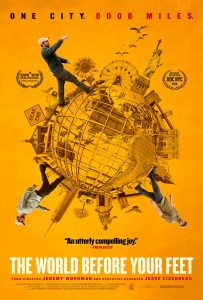
Some may say there’s no commercial value in taking on ventures like the one that Matt Green has tackled. But, as his experience has revealed, must that always be the case with anything that we undertake? Sometimes the sheer enjoyment value of pursuing such personally meaningful quests is far greater than anything that money can buy, and, thankfully, there are still those among us out there who haven’t lost sight of that.
Copyright © 2019, by Brent Marchant. All rights reserved.
Thursday, June 6, 2019
This Week in Movies with Meaning
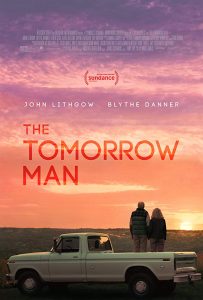



Tuesday, June 4, 2019
‘The Tomorrow Man’ urges us to live in the moment
“The Tomorrow Man” (2019). Cast: John Lithgow, Blythe Danner, Derek Cecil, Katie Aselton, Sophie Thatcher, Eve Harlow, Wendy Makkena, Isabelle Boni, Naveen Havannavar, John Sindoni. Director: Noble Lincoln Jones. Screenplay: Noble Lincoln Jones. Web site. Trailer.
There’s nothing wrong with looking ahead – unless, of course, it becomes so compulsive that it keeps us from enjoying (or perhaps even recognizing) what’s going on around us – the present moment in which we dwell. It’s somewhat akin to being more worried about taking a smart phone photo of a significant event than the event itself. Yet, as comical as that may sound, all too often our focus is misplaced, myopically cast on the erroneous priority. We can miss a lot by doing that, something we could end up regretting if we do it for too long and let what truly matters go unrecognized as time evaporates away from us. Such is the potential pitfall faced by a worrisome, somewhat paranoid senior in the new romantic comedy-drama, “The Tomorrow Man.”
Ed Hemsler (John Lithgow) worries incessantly about the future. The retired sixtysomething former systems analyst lives in a small town that could be virtually anywhere in the US, where everyday solid citizens dutifully go about their business believing that nothing will ever change as life goes on. But not Ed. He spends virtually all of his time – and money – prepping for some kind of looming but undefined disaster, be it war, economic collapse, martial law or Donald Trump’s re-election. He readies for this enigmatic indeterminate catastrophe by stockpiling everything from food to toilet paper to condoms in a secret storage room in his house, one whose existence he guards as if it’s Ft. Knox.
Ed’s preoccupation makes him something of a loner. The senior divorcee separated from his ex-wife years ago, and he has little (and mostly one-sided) contact with his son, Brian (Derek Cecil). Because of his relentless pontificating about the need to be prepared, as well as his incessant conspiracy theory rants, nobody really wants to talk to him except for a handful of kindred spirits on the internet. He doesn’t seem to mind too much, but he also does little to change his circumstances – that is, until he goes shopping at the local supermarket one day.
While picking up items for his everyday needs and supplementing his storage room’s supplies, Ed spies a spry but reserved fellow senior, Ronnie Meisner (Blythe Danner). He’s instantly smitten. Yet acting on an attraction to someone else is decidedly out of character for Ed, and his awkward initial attempts at getting to know her fall flat. Nevertheless he finds something special about Ronnie, and, in time, she discovers the same about him. And so, despite their cumbersome beginning, before long, the seemingly mismatched duo is an item.
[caption id="attachment_10753" align="aligncenter" width="300"] Seniors Ed Hemsler (John Lithgow, background) and Ronnie Meisner (Blythe Danner, foreground) find love at an unexpected time in their lives in the delightfully quirky new romantic comedy, “The Tomorrow Man.” Photo courtesy of Bleecker Street.[/caption]
Seniors Ed Hemsler (John Lithgow, background) and Ronnie Meisner (Blythe Danner, foreground) find love at an unexpected time in their lives in the delightfully quirky new romantic comedy, “The Tomorrow Man.” Photo courtesy of Bleecker Street.[/caption]
As their relationship evolves, however, not everything proceeds smoothly. Despite his feelings for Ronnie, Ed never lets go of his survivalist prepping. At the same time, Ronnie struggles with baggage of her own, issues that conceal a dark secret that she’s reluctant to share with anyone, including Ed. Their respective concerns hang over each of them (and one another) like pesky little dark clouds that intrude on what should be a happy time in their lives. In essence, Ed frets about a future that hasn’t happened (and may never do so), while Ronnie struggles to let go of a painful past that obstinately persists despite any efforts to shed it.
One can’t help but hope that this otherwise-seemingly happy couple will figure out a way to make things work. But, no matter what they do, Ed and Ronnie don’t seem to be able to get out of their own way. Can they succeed in their efforts? And will they do so before it’s too late to do anything about their circumstances? With the clock ticking and uncertainty always lurking around the corner, there may be fewer and fewer opportunities to rectify their situation. Will they choose happiness or succumb to inevitable disappointment?
As in virtually any situation, the choice rests with Ed and Ronnie, and those choices are governed by their respective and joint beliefs, the building blocks of the conscious creation process, the philosophy that maintains we draw upon these resources to manifest the reality we experience. And, because our beliefs can take any form we desire, we can essentially use them to create whatever we want. The trick in understanding this, though, is that we’re the ones who choose which of those beliefs to embrace, so it’s thus up to us as far as what we experience.
[caption id="attachment_10754" align="aligncenter" width="300"] Senior Ronnie Meisner (Blythe Danner) dresses up for a date for the first time in years in director Noble Lincoln Jones’s debut feature, “The Tomorrow Man.” Photo courtesy of Bleecker Street.[/caption]
Senior Ronnie Meisner (Blythe Danner) dresses up for a date for the first time in years in director Noble Lincoln Jones’s debut feature, “The Tomorrow Man.” Photo courtesy of Bleecker Street.[/caption]
For Ed and Ronnie, their respective beliefs are governed by elements that make their alteration challenging. As noted previously, Ed is preoccupied with the future, while Ronnie is tied to her past. In each case, they’re invested in beliefs associated with time frames over which they have no control. Ed’s future has not arrived and, consequently, could end up taking myriad forms, none of which can be definitively predicted in advance. Meanwhile, Ronnie’s past is behind her, a done deal over which she has no say over how it unfolded, regardless of how unpalatable or unpleasant she may find it. So that leaves only one temporal window over which they (or any of us, for that matter) have any meaningful control – the present.
Seasoned conscious creators understand that the present is the point of power, because it’s the only time frame over which we can shape its character and qualities. The concept of “living in the moment” is thus a principle we’d be wise to adopt.
However, as much as we may like the sound of this idea, many of us find it difficult to put it into action, and that’s largely because of the persistence of our beliefs. This in itself shows how powerful they are and how doggedly they can hang on, despite efforts to change them, even when we know that the ones we’re embracing aren’t necessarily in our best interests.
This casts a bright light on the need to get a firm handle on the precise nature of our beliefs. This involves looking inward and taking stock of who we are and what we really believe. Some of us may not succeed at this out of fright at what we might find, what we could stand to lose or the uncertainty of having to venture into uncharted territory. Nevertheless, if we want to truly be effective as conscious creators, we must be courageous enough to tap into our authentic selves to determine exactly what’s driving our manifestations, how we might want to change them if needed and what it takes to allow our personal integrity to shine through into our materializations.
Where Ed and Ronnie are concerned, for example, they’re at the age where they’re each staring their own mortality squarely in the face. That’s a scary prospect for those who haven’t considered it, and denial is a coping mechanism commonly employed for evading it. But is this strategy helpful in the end? If Ed endlessly plans for the future, then maybe he’s lulled himself into believing that his life will also carry on in perpetuity, that his constant vigilance against potential calamities will somehow stave off the one that ultimately scares him most. Similarly, if Ronnie believes she can bury herself in the memories of her past – no matter how distressing some of them may have been – then perhaps that will obscure her appearance at the time when the Grim Reaper comes knocking at her door.
[caption id="attachment_10755" align="aligncenter" width="300"] The sunset years can be so bright that they really do require shades as seniors Ronnie Meisner (Blythe Danner, foreground) and Ed Hemsler (John Lithgow, background) learn for themselves in “The Tomorrow Man.” Photo courtesy of Bleecker Street.[/caption]
The sunset years can be so bright that they really do require shades as seniors Ronnie Meisner (Blythe Danner, foreground) and Ed Hemsler (John Lithgow, background) learn for themselves in “The Tomorrow Man.” Photo courtesy of Bleecker Street.[/caption]
Realistically speaking, however, do these really sound like viable solutions? Wouldn’t it be preferable to channel our beliefs into more fruitful pursuits, ones that give us joy and allow us to relish whatever time we have left, to truly live in the moment? Such options are available, but it’s up to us to embrace beliefs that genuinely make them possible. Indeed, the choice is ours.
This delightfully quirky senior romance tale charms from beginning to end. Its deceptively subtle, surprisingly insightful narrative gives viewers much to think about, especially those of us who are a little further along our life paths. Its bittersweet story line presents a realistic view of romance later in life, particularly for partners who cling to eccentricities they cannot shed but who at least have one other to see their way through the tenuous and painful process. While not all elements of the film or the characters work, and even though some aspects are a little too formula for their own good, the picture nevertheless has more than its share of funny twists and turns, as well as superb performances by John Lithgow and Blythe Danner as the unlikely consorts. Director Noble Lincoln Jones’s beautifully shot debut feature serves up an excellent example of living in the moment, without worrying about a past that has come and gone and a future that has yet to arrive. Think of this as a geriatric version of “Seeking a Friend for the End of the World” (2012) but without the rampant silliness, and you’ve got an idea what this release is all about.
“The Tomorrow Man” is currently playing in limited release in theaters specializing in independent and arthouse cinema. Given the upcoming crush of summer blockbusters, this offering may quickly be overwhelmed by the competition and swept out of moviehouses, so act quickly if you hope to catch this one on the big screen.
It would be foolhardy to say we should never consider the contingencies available to us. Indeed, Plan B has its place. But, when we engage in the kind of preparation that leads us to making so many plans that we run out of letters of the alphabet, maybe we need to step back and examine what we’re doing – and why. When planning our life becomes more important than living it, something is definitely amiss. The cautionary tale of “The Tomorrow Man” puts this on display for all of us to see, reminding us to look up once in a while and enjoy the view – while it lasts.
Copyright © 2019, by Brent Marchant. All rights reserved.
Tour Gotham on The Cinema Scribe


